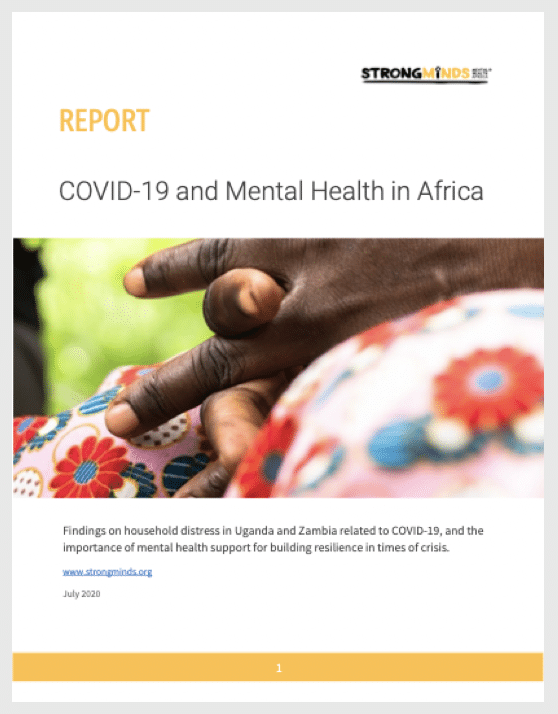PRESS RELEASE: COVID-19 and Mental Health in Africa
NEW REPORT SHOWS HOUSEHOLD DISTRESS IS ON THE RISE
IN UGANDA AND ZAMBIA DUE TO PANDEMIC
 KAMPALA, UGANDA – The COVID-19 pandemic is triggering an increase in persistent stress, anxiety, and depression symptoms in low-income households in Uganda and Zambia. This comes from a ground-breaking June 2020 survey of 12,000 women in low-income communities in Uganda and Zambia conducted by StrongMinds, a mental health organization working in both countries. Results are published in the report, COVID-19 and Mental Health in Africa.
KAMPALA, UGANDA – The COVID-19 pandemic is triggering an increase in persistent stress, anxiety, and depression symptoms in low-income households in Uganda and Zambia. This comes from a ground-breaking June 2020 survey of 12,000 women in low-income communities in Uganda and Zambia conducted by StrongMinds, a mental health organization working in both countries. Results are published in the report, COVID-19 and Mental Health in Africa.
Nearly a quarter of the women surveyed reported experiencing heightened mental distress due to recent world events, citing increased unemployment, food insecurity, household violence, and substance abuse stemming from the pandemic.
All survey participants had previously received mental health services from StrongMinds[1], which teaches positive coping skills as part of its therapy program. Encouragingly, roughly 70% of the women surveyed reported using these positive coping mechanisms to respond to the pandemic, suggesting that previous mental health support had bolstered their ability to respond to a crisis situation. This supports the United Nations’ recent call for investment in global mental health services during the pandemic.
“The mental health impacts of COVID-19 should not surprise anyone. But, to our knowledge, this is the most far-reaching effort to collect the data and better understand the true toll of the pandemic,” said Sean Mayberry, Founder and Executive Director of StrongMinds. “There is an urgent need to direct funding toward mental health services in sub-Saharan Africa.”
The survey results show the increased need for broad-based mental health support and psycho-education to help individuals, families, and communities cope with adversity during the pandemic and beyond.
Contact:
Roger Nokes
Media & Engagement Manager
roger@strongminds.org
[1] StrongMinds treats depression in low-income women and adolescents in Uganda and Zambia using Group Interpersonal Therapy (IPT-G).
